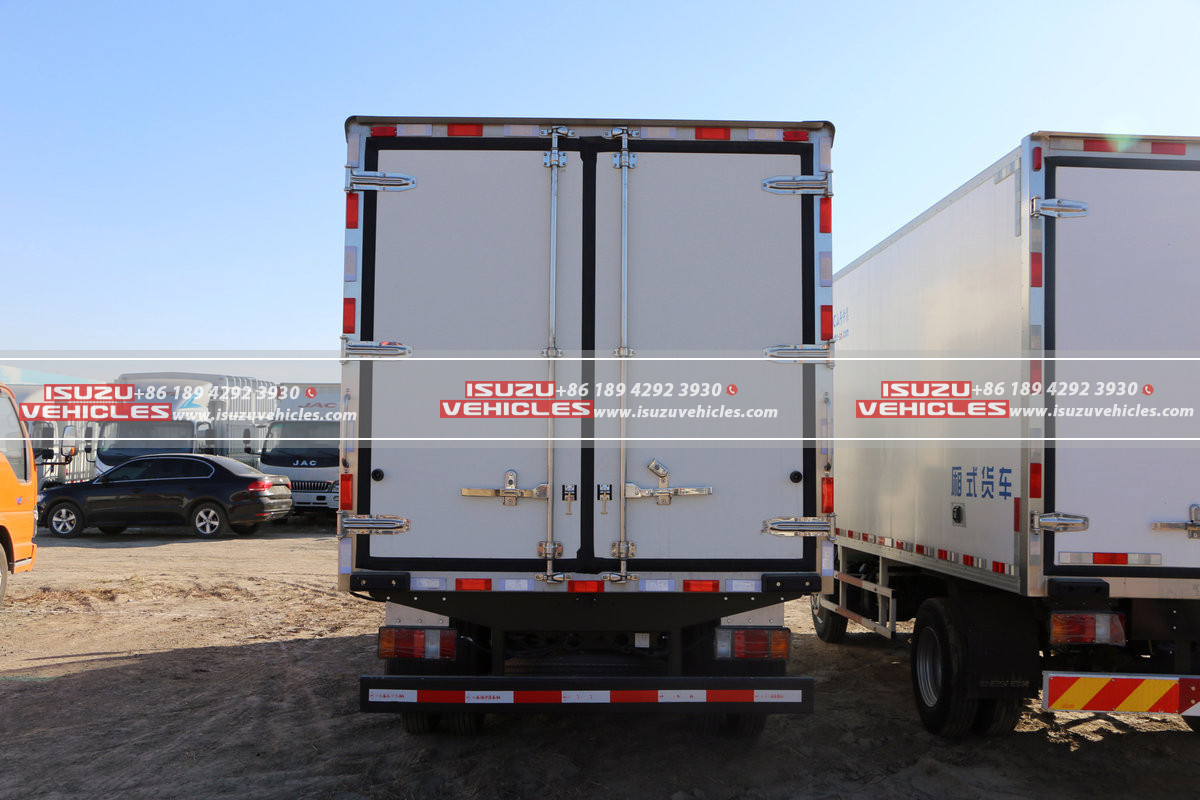In a significant move to enhance the logistics and transportation sector in Ecuador, the new ISUZU Dry Van Truck has arrived, promising to transform the way cargo is moved across the country. Engineered for durability, efficiency, and security, this versatile vehicle is set to meet the growing demands of industries reliant on dependable cargo transport. With its advanced features, the ISUZU Dry Van Truck is poised to play a pivotal role in improving supply chain operations across Ecuador, ensuring goods are delivered safely and on time, no matter the distance or weather conditions.
1. Enhancing Ecuador’s Logistics Sector
Ecuador, a country with diverse terrain and a growing economy, requires robust logistics solutions to keep its industries moving efficiently. The introduction of the ISUZU Dry Van Truck is a game-changer, offering a reliable and secure solution for transporting a wide range of goods. Whether moving perishable items, electronics, or industrial equipment, the ISUZU Dry Van Truck provides the space and protection necessary for all types of cargo. This addition to Ecuador’s fleet of vehicles is designed to streamline deliveries, providing an efficient way to handle goods with greater precision and security.
Unlike open-body transport options, such as ISUZU flatbed trucks, the ISUZU Dry Van Truck offers enclosed cargo space, which is essential for protecting goods from environmental factors like rain, dust, and theft. Its sealed cargo area is particularly beneficial for industries that need to transport sensitive goods, from food products to electronics. This increased security and weatherproof capability will significantly improve supply chain management for businesses across Ecuador.
As the demand for efficient and secure cargo transport increases in Ecuador, the ISUZU Dry Van Truck ensures that companies can handle a wide range of goods, further accelerating the nation’s commercial growth.
2. Key Features of the ISUZU Dry Van Truck
The ISUZU Dry Van Truck combines versatility with advanced technology, making it an essential tool for any fleet looking to improve cargo transport efficiency. This vehicle is designed to handle both short- and long-distance routes with ease, ensuring smooth operations even in challenging conditions. Below are some of the key features that set the ISUZU Dry Van Truck apart from other commercial vehicles:
Spacious and Secure Cargo Area
The ISUZU Dry Van Truck features a large, enclosed cargo space that provides ample room for various types of goods. Whether it’s perishable items requiring temperature control or large machinery, the truck can accommodate diverse loads. The van’s sealed design ensures that cargo remains safe from the elements, making it an ideal choice for industries that need to transport valuable or temperature-sensitive items.
Efficient Fuel Consumption
The ISUZU Dry Van Truck is engineered with fuel efficdriency in mind. Powered by ISUZU’s trusted engines, the truck is optimized to reduce fuel consfaumption, making it a cost-effective solution for long-haul trips. This feature is particularly beneficial for companies looking to manage operating costs without compromising on performance or reliability.
Durable Construction for Long-Term Use
Built with high-quality materials, the ISUZU Dry Van Truck is designed to withstand the rigors of daily use in the transportation industry. The robust construction ensures that the truck can handle the wear and tear associated with transporting heavy and bulky goods. Over time, this durability translates to lower maintenance costs, making it a smart long-term investment for logistics companies.
3. The Role of ISUZU’s Broader Fleet in Ecuador’s Transport Network
While the ISUZU Dry Van Truck is set to play a central role in Ecuador’s cargo transport, the truck is part of a broader fleet of ISUZU trucks designed to meet various logistical needs. With other options, such as the ISUZU cargo truck, ISUZU box truck, and ISUZU flatbed truck, ISUZU offers a versatile range of vehicles that address the unique demands of different industries.
Complementary Vehicles for Comprehensive Solutions
For businesses that need more than just an enclosed cargo area, the ISUZU flatbed truck and ISUZU box truck provide additional flexibility. The ISUZU flatbed truck is ideal for transporting oversized or heavy cargo that does not require protection from the weather, such as construction materials, while the ISUZU box truck offers a middle ground with enclosed space for smaller, yet still vulnerable goods. Together, these vehicles can be seamlessly integrated into a comprehensive transportation fleet, ensuring that logistics companies in Ecuador can tackle any delivery challenge with ease.
In addition, the ISUZU cargo truck can handle diverse payloads, making it suitable for various industries, from agriculture to manufacturing. Its combination of durability, power, and fuel efficiency ensures that it remains a preferred choice for cargo transport across the country.
Building an Integrated Fleet for Future Growth
By incorporating these vehicles into a cohesive fleet, businesses can manage a wide range of transportation needs, from perishable goods to heavy equipment. With the combined capabilities of the ISUZU Dry Van Truck and its complementary vehicles, logistics companies in Ecuador will be better equipped to handle the demands of a growing economy and an increasingly interconnected market.
The arrival of the ISUZU Dry Van Truck in Ecuador marks an exciting new chapter for the country’s logistics industry. With its secure cargo space, fuel-efficient engine, and long-lasting durability, the ISUZU Dry Van Truck provides a reliable solution for moving goods across the country. When combined with other ISUZU trucks like the ISUZU cargo truck, ISUZU box truck, and ISUZU flatbed truck, businesses now have the tools they need to meet the challenges of an evolving market. With this new addition to the fleet, Ecuador’s transportation infrastructure is well-positioned for the future, enabling companies to boost efficiency and meet the growing demands of the logistics sector.
